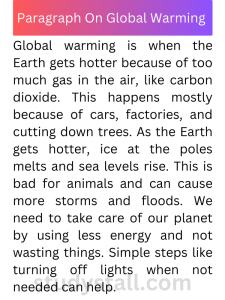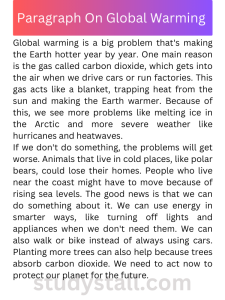Global warming is an alarming and pressing issue that is affecting our planet at an unprecedented rate. It refers to the long-term increase in Earth’s average surface temperature due to human activities, primarily the emission of greenhouse gases into the atmosphere. This phenomenon has significant consequences for our environment, ecosystems, and future generations. In this article, we will delve into the causes, impacts, and potential solutions to address the challenges posed by global warming.
Paragraph On Global Warming 100 Words
Global warming is when the Earth gets hotter because of too much gas in the air, like carbon dioxide. This happens mostly because of cars, factories, and cutting down trees. As the Earth gets hotter, ice at the poles melts and sea levels rise. This is bad for animals and can cause more storms and floods. We need to take care of our planet by using less energy and not wasting things. Simple steps like turning off lights when not needed can help.
Paragraph On Global Warming 200 Words
Global warming is a big problem that’s making the Earth hotter year by year. One main reason is the gas called carbon dioxide, which gets into the air when we drive cars or run factories. This gas acts like a blanket, trapping heat from the sun and making the Earth warmer. Because of this, we see more problems like melting ice in the Arctic and more severe weather like hurricanes and heatwaves.
If we don’t do something, the problems will get worse. Animals that live in cold places, like polar bears, could lose their homes. People who live near the coast might have to move because of rising sea levels. The good news is that we can do something about it. We can use energy in smarter ways, like turning off lights and appliances when we don’t need them. We can also walk or bike instead of always using cars. Planting more trees can also help because trees absorb carbon dioxide. We need to act now to protect our planet for the future.
Paragraph On Global Warming 300 Words
Global warming is a serious issue that everyone should be concerned about. It’s causing our planet to heat up, which leads to all kinds of problems. The main reason is the increase of gases like carbon dioxide in the atmosphere. When we burn fossil fuels, like coal and oil, to run cars and factories, we add more of these gases. These gases trap heat from the sun, which makes the Earth warmer.
This warming affects everything from the weather to the sea levels. For example, as the Earth heats up, ice in places like the Arctic and Antarctic starts to melt. This causes sea levels to rise, which can lead to flooding in areas near the coast. It also hurts animals that live in cold places because they lose their natural habitat. The weather can also become more extreme, with stronger storms and longer heatwaves, which is bad for people and animals alike.
But there is hope. Each one of us can help fight global warming by making small changes in our daily lives. For example, we can save energy by turning off lights and electronics when we don’t need them. Using less water and recycling can also make a difference. On a bigger scale, governments can make laws that limit how much carbon dioxide is allowed to be released. They can also invest in clean energy like solar and wind power. If everyone does their part, we can slow down global warming and protect our planet for future generations. It’s a big job, but together we can make a difference.
Paragraph On Global Warming 500 words
Causes of Global Warming
Human activities are the primary drivers of global warming. The burning of fossil fuels such as coal, oil, and natural gas for energy production and transportation releases substantial amounts of carbon dioxide (CO2) and other greenhouse gases into the atmosphere. Deforestation, industrial processes, and agricultural practices also contribute to the emission of greenhouse gases like methane (CH4) and nitrous oxide (N2O).
Impacts of Global Warming
The consequences of global warming are far-reaching and diverse, affecting various aspects of our environment and society. Some notable impacts include:
- Rising Temperatures: Global warming is causing a steady rise in temperatures worldwide, leading to heatwaves, increased frequency of droughts, and altered precipitation patterns. These temperature shifts disrupt ecosystems, harm wildlife, and pose health risks to humans.
- Melting Ice Caps: As temperatures rise, glaciers and polar ice caps are melting at an accelerated pace. This ice loss contributes to rising sea levels, endangering coastal communities and low-lying areas. Furthermore, the reduced ice coverage affects marine ecosystems and wildlife that rely on these habitats.
- Extreme Weather Events: Global warming intensifies extreme weather events such as hurricanes, typhoons, and cyclones. These events become more frequent and severe, causing widespread destruction, loss of life, and economic disruptions.
- Ocean Acidification: The excess CO2 in the atmosphere is not only warming the planet but also getting absorbed by oceans. This process leads to ocean acidification, which harms coral reefs, shellfish, and other marine organisms reliant on carbonate ions for their existence.
- Biodiversity Loss: The changing climate disrupts ecosystems and threatens biodiversity. Many species struggle to adapt or migrate quickly enough to survive, leading to a loss of plant and animal species worldwide. This loss of biodiversity has cascading effects on ecological balance and human livelihoods.
Solutions to Address Global Warming
To mitigate and adapt to global warming, concerted efforts are required on individual, societal, and governmental levels. Some potential solutions include:
- Transition to Renewable Energy: Shifting our energy production from fossil fuels to renewable sources such as solar, wind, and hydroelectric power can significantly reduce greenhouse gas emissions. Investing in research and development of clean energy technologies is crucial to accelerate this transition.
- Energy Efficiency and Conservation: Promoting energy-efficient practices and technologies can help reduce overall energy consumption. Simple measures like insulating homes, using energy-efficient appliances, and adopting sustainable transportation options contribute to minimizing greenhouse gas emissions.
- Afforestation and Reforestation: Planting trees and restoring forests play a vital role in absorbing CO2 from the atmosphere. These actions enhance carbon sinks, conserve biodiversity, and provide numerous ecological benefits.
- Sustainable Agriculture: Implementing sustainable agricultural practices, such as organic farming and precision irrigation, can reduce greenhouse gas emissions from the agricultural sector. These practices also promote soil health, water conservation, and food security.
- Adaptation and Resilience: Investing in climate adaptation measures is crucial to minimize the impacts of global warming on vulnerable communities. This includes developing early warning systems, enhancing infrastructure resilience, and promoting sustainable urban planning.
- International Cooperation: Addressing global warming requires international collaboration and agreements. Nations must work together to establish and enforce policies that limit greenhouse gas emissions, promote technology transfer, and support developing countries in their adaptation efforts.
In conclusion, global warming is an urgent global challenge that demands immediate action. By understanding its causes, impacts, and potential solutions, we can work towards mitigating its effects and creating a sustainable future. Each individual’s contribution, along with collective efforts, will play a significant role in preserving our planet for future generations. Let us take responsibility and act swiftly to combat global warming and protect our environment.
Frequently Asked Questions (FAQ)
1. What is global warming?
Global warming refers to the long-term increase in Earth’s average surface temperature due to human activities, primarily the emission of greenhouse gases into the atmosphere.
2. What are the causes of global warming?
The primary causes of global warming are human activities such as the burning of fossil fuels for energy production and transportation, deforestation, industrial processes, and agricultural practices that release greenhouse gases into the atmosphere.
3. What are the impacts of global warming?
The impacts of global warming include rising temperatures, melting ice caps leading to rising sea levels, extreme weather events becoming more frequent and severe, ocean acidification, and biodiversity loss.
4. How does global warming affect biodiversity?
Global warming disrupts ecosystems and threatens biodiversity by causing changes in temperature and precipitation patterns. Many species struggle to adapt or migrate quickly enough to survive, leading to a loss of plant and animal species.
